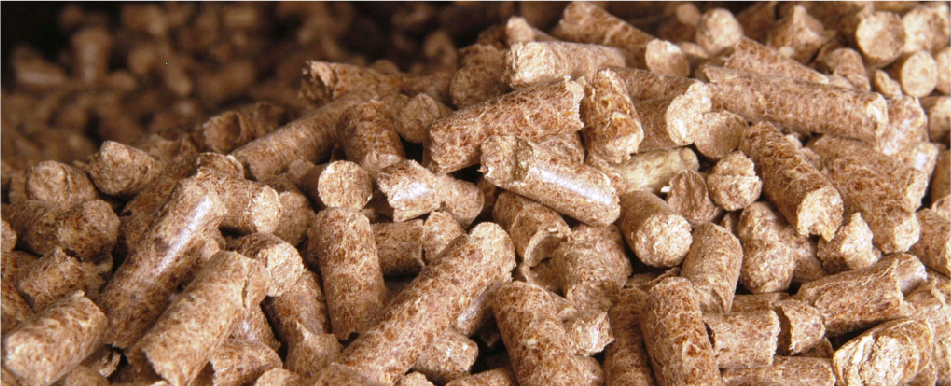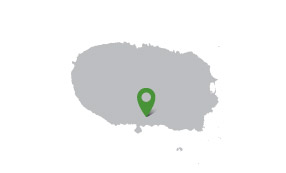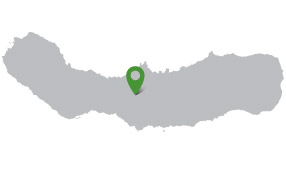Projects

Production projects
At the production level, NaturalReason Ltd was responsible for 3 european investment projects. These are 3 projects submitted to the Regional Development Incentives System (SIDER) that aim to build 3 factories of Forest Biomass Energy Recovery.
The plants will be built in Terceira, Pico and São Miguel islands and will be responsible for the annual production of about 100,000 tons of pellets/year. The pellets will be destined for local, national or international consumption whether on industries, district heating or domestic clients. Since the start that the export was seen as an ally to the development of strong business. We expected that about 50% of the total annual production will follow this route.
NaturalReason´s project was recognized by the Azores Regional Government as RIP - Regional Interest Project, in 2012.
Learn more about SIDER program by clicking on the following image:



Terceira
The plant to be built on Terceira will have a production capacity of about 5ton pellets/hour and will represent 31% (30000ton/year) of the company's total production capacity. This will be located at Grota dos Calrinhos, São Bento, and will have a total cover area of about XXX m2.
The unit will generate near 20 new jobs directly associated to the factory and about 33 indirect jobs. The work will be divided into 2 shifts of 8 hour each.

Pico
Similar to NSimilar to Terceira Island, the Pico unit will have a total capacity of production of about 5 ton pellets/hour, contributing with 31% of NaturalReason’s total production. The unit will be build in Santa Luzia Industrial Park and will cover a total of XXm2.
It is expected the creation of 20 new jobs that will work on two 8 hour shifts per day. With the local company’s partnerships will also be created about 30 indirect new jobs.

São Miguel
It is in São Miguel Island that the biggest industrial unit from NaturalReason will be built. Here we will have a total installed capacity of about 6 ton of pellets/hour, witch will represent about 38% of the company overall production (36000ton/year).
The unit with XXm2 of total cover area will be located on Ribeira Grande Industrial Park on Conceição parish and will create 20 new fulltime jobs that will work on two 8 hour shifts. We estimate that the indirect new job creation will reach about 33 persons.
Environmental projects
The harmony with nature has never been as important and valued by companies throughout the world as it currently is. This harmony is not only a responsibility that is required from every citizen but also from all the authorities and companies with minimal awareness and respect for the planet.
Just because a company focus its business in the renewables sector is doesn't mean that it could overlook any kind of environmental responsibilities. Moreover, as these depend directly on the balance and the normal rhythm of nature, these are the key stakeholders that balance is never lost.
In the case of companies that produce biofuels is crucial that in the business development, they always maintain a strategy of sustainable growth, since is the only way to ensure either the present or the future of their business.Biomass, compared to other biofuels, requires a separate planning, as in the case of wood, the growth periods of raw materials are relatively extensive. It is therefore important that any company in the pellets production buisness to have a plan that ensure normal operation and to safeguard a possible increase in demand. Based on the above assumptions, NaturalReason developed two environmental projects which will be described below:

PROJECT OF FLORESTATION AND FLORESTAL CONVERSION OF AGRICULTURAL AND ECOLÓGICAL RESERVES
The increase of the Azores forest area either by afforestation of new locations or by conversion of agricultural and ecological reserves in which the presence of forest represent a greater value than the current use of space.
The project will be developed in line with the regional authorities and in partnership with the University of the Azores. The expected environmental gains are big, namelly the increase of air quality and the increase of the availability of soil water.
The process of afforestation as well as selecting the best species to deploy in places should be accompanied by skilled technicians so that we can get the most from of the plant and from the soil.
NaturalReason have interest in exploring production forests that may be created. It will also be created under the project a timetable of planting and harvesting processes in order to ensure a positive balance in biomass. A forestry plan will be made to ensure normal operation of the production, thus minimizing the impacts to the the soil and landscape.
Overall, with the implementation of the project, we believe we can contribute to the increase of forest in the Azores and on the other hand ensure the sustainability and viability of the industrial project undertaken by NaturalReason.
PROJECT OF PRODUCTION FOREST GROWTH EVALUATION WITH ADDICTION OF BIOMASS ASHES
Evaluate the growth of forest species in several soils and at different altitude levels, with and without the addition of ash resulting from burning biomass. It is intended to evaluate and measure the capacity of incorporating the ashes from the soil, and correlate the amounts applied to the growth of the tree species.
The study of forest species growth is a job that necessarily has to be performed in a large timeline. Only then we can check and validate the test results. The University of the Azores will be an important partner in the realization of studies, in particular the Department of Agricultural Sciences and Department of Biology which shall coordinate scientific teams that will carry out the work.
In biomass burning ashes are generated which are often sent to landfills. This is a destination we think is wrong. There are studies conducted in other countries where the ashes resulting from pellets burning were incorporated in forest soils resulting in a better balance of the soil, which helped to improve forest production. The methodology used in these studies can be applied in the Azores, and the amounts of ash applied will have to be revised taking into account the specificities of the Azorean soil.
In this project we aim to complete an environmental cycle. Also, by the recicling of wood ash, we prevent waste production and some environmental problems.
Forest resources in São Miguel Island (Azores): Global characterization and potential for energetic use.
The overall objective of the present doctoral research is the characterization of the forest resources in São Miguel Island, with a special emphasis on exotic woodland dominated by P. undulatum.
The overall objective of this research is to characterize the forest resources in São Island, Azores, mainly those areas dominated by exotic woodland, including P. undulatum.The importance of native species like Morella faya will also be evaluated, since it might be used to replace alien species in the long term.
The main research questions will be:i) what is the available forest biomass, particularly in exotic woodland and in invaded semi-natural areas?ii) is it possible to sustainably use exotic woodlands for energetic use?iii) where and with what species would it be possible to increase the forest production areas?iv) would it be possible/desirable to replace aliens by native species like M. faya in the long term?
The forest inventory will be used as support to identify areas dominated by the target species. Different tools will be used to obtain and analyse data. A geographic information system (GIS) will be used to manage field data. Models will be developed to relate dendrometric traits and standing biomass. Tree age determination methods will be used to estimate the rotation period.Species distribution models and a multi-criteria analysis will be used to determine potential areas for expansion of production forest.This research will allow an integrated and sustainable view of the forest resources in São Miguel Island.The results will have not only scientific relevance in the area of forest ecology and management but will also support the use of areas that are presently worthless in terms conservation and economy.
Forest resources in Pico Island (Azores): Global characterization and potential of energetic use.
The overall objective of the present doctoral research is to make an integrated analysis of the forest resources available in Pico Island in order to provide guidelines for their sustainable energetic use.
Pico is still one of the islands with a largest forest cover. While important areas are included inside the Island Natural Park and are primarily intended for conservation, many areas are presently invaded by Pittosporum undulatum.The overall objective of this research is to characterize the forest resources in Pico Island, Azores, mainly those areas dominated by exotic woodland, including P. undulatum. The importance of native species like Morella faya will also be evaluated, since it might be used to replace alien species in the long term.
The main research questions will be:i) what is the available forest biomass?ii) how is it possible to sustainably use the exotic woodland for energetic use?iii) where and with what species would it be possible to increase the production forest areas?iv) would it be possible/desirable to replace alien by native species like M. faya in the long term?
The forest inventory will be used as support to identify areas dominated by the target species. Different tools will be used to obtain and analyse data. A geographic information system (GIS) will be used to manage field data. Models will be developed to relate dendrometric traits and standing biomass. Tree age determination methods will be used to estimate the harvesting period. Species distribution models and a multi-criteria analysis will be used to determine potential areas for expansion of production forest.This research will allow an integrated and sustainable view of the forest resources in Pico Island.The results will have not only scientific relevance in the area of forest ecology and management but will also support the use of areas that are presently worthless in terms conservation and economy.



